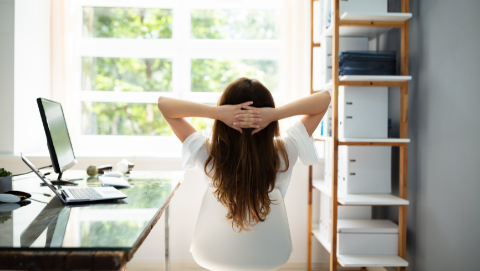Please give us feedback on one of our weekly question and answer articles. We value your time so the evaluation will only take 3 minutes or less, we promise!
Take the Survey »How To Relax After a Stressful Day
By Eva Timothy, Professional Practice Extension Assistant Professor
We can all agree that stress is a part of human existence. Dealing with short stints of stress is not bad for us. This type of stress can propel us into action or increase our energy levels and memory to help us complete a task or goal (Jaret, n.d.). Conversely, when people experience high levels of stress for long periods, it can lead to major health concerns. The American Psychological Association (2018) tells us that these health concerns range from heart disease to exacerbated reproductive difficulties. Prolonged stress can also lead to what is known as burnout- a state of mental, physical, and emotional fatigue that reduces productivity. So, whether you are experiencing good or bad stress, that is either occasional or prolonged, practicing self-care through the use of calming can benefit you.
Here are some calming practices you can try at the end of a stressful day to calm your mind and body. This will reduce the negative impacts stress can have on your health and relationships.1. Do something you enjoy. Whether it be indulging in a hobby or soaking in a bubble bath, do it. When we engage in activities we find enjoyable it allows our mind to take a break from what is causing our stress. We can lose ourselves in something that fuels our sense of passion for life, thereby, reinvigorating our ability to healthily cope with the next stressor.
2. Find a quiet place where you can practice deep breathing and focus on the here and now. When we get stressed, we get stuck in the brainstem, the fight, flight, or freeze part of the brain meant for survival. Deep breathing calms the brainstem and allows us to move to higher levels of thinking. Once we are in those higher levels of rationale, we can focus on how we feel physically and our current thoughts.
3. If you require a quick way to relieve stress without acquiring a quiet space, practice those deep breaths. Just breathing deeply for a few minutes can help reduce stress levels.
4. The American Psychological Association (2018) recommends utilizing our circle of friends and family to help us manage our stress levels.
5. If you find that your muscles are tense from the day's stress, try some progressive muscle relaxation. For this form of stress relief, you will tense and release various muscles in the body. Work from one end of the body to the other, tensing for 5 seconds and resting for 30 seconds before going to the next area. This technique also helps to refocus the mind and make us aware of what is occurring in our bodies (Mayo Foundation for Medical Education and Research, 2022).
For more ideas on what you can do to reduce the effects of a stressful day, visit https://www.mayoclinic.org/healthy-lifestyle/stress-management/in-depth/relaxation-technique/art-20045368.
References
American Psychological Association. (n.d.). Stress effects on the body. American Psychological Association. Retrieved May 2, 2022, from https://www.apa.org/topics/stress/body
Jaret, Peter. (n.d.). The surprising benefits of stress. Greater Good. Retrieved May 2, 2022, from https://greatergood.berkeley.edu/article/item/the_surprising_benefits_of_stress
Mayo Foundation for Medical Education and Research. (2022, April 28). Relaxation techniques: Try these steps to reduce stress. Mayo Clinic. Retrieved May 2, 2022, from https://www.mayoclinic.org/healthy-lifestyle/stress-management/in-depth/relaxation-technique/art-20045368

